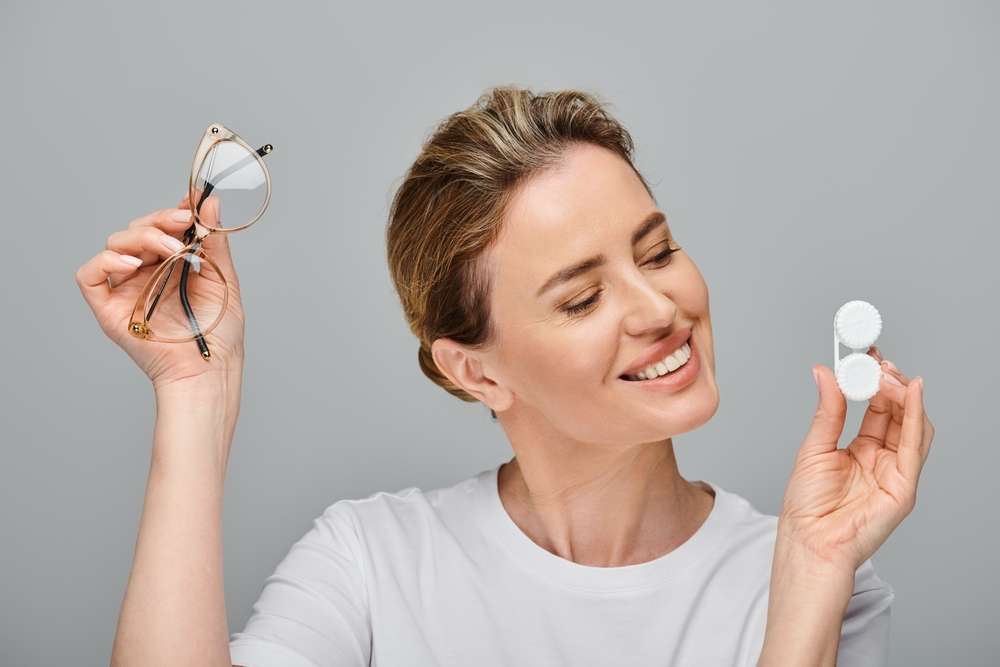
Wearing glasses has been a common solution for vision correction, but for many people, the desire to be free from the constraints of frames and lenses has led them to explore the world of contact lenses. Transitioning from glasses to contacts can be an exciting and liberating experience, but it's important to understand what to expect during the process.
Types of Contact Lenses Available
The contact lens market offers a diverse array of options, each with its own unique features and benefits. Understanding the different types of contact lenses can help you make an informed decision that aligns with your needs and preferences.
Soft Contact Lenses
· Made of flexible, breathable materials that conform to the shape of your eye
· Offer a comfortable and natural-feeling wearing experience
· Available in a variety of modalities, including daily disposable, bi-weekly, and monthly replacement
Rigid Gas Permeable (RGP) Lenses
· Offer sharper, more precise vision correction
· Tend to be more durable and longer-lasting than soft lenses
· Require a longer adaptation period but can provide exceptional visual acuity
Hybrid Lenses
· Combine the benefits of soft and RGP lenses
· Offer the comfort of soft lenses with the optical clarity of RGP lenses
· Provide a good balance between vision quality and comfort
Specialty Lenses
· Designed to address specific vision needs, such as astigmatism, presbyopia, or keratoconus
· Require a more comprehensive eye examination and fitting process
· Offer tailored solutions for complex vision correction requirements
When exploring these options, it's essential to work closely with your optometrist to determine the most suitable contact lens type for your individual needs and eye health.
Determining Which Type of Contact Lens is Right for You
Choosing the right contact lens for your eyes is a crucial step in the transition from glasses to contacts. Your optometrist will play a vital role in guiding you through this process, as they have the expertise to evaluate your unique vision needs and eye health.
During your contact lens examination, your optometrist will assess factors such as the shape and curvature of your eyes, the degree of your refractive error, and any existing eye conditions or sensitivities. This comprehensive evaluation will help them determine the most appropriate contact lens type, size, and power for your eyes.
In addition to the technical aspects of the fitting, your optometrist will also consider your lifestyle and preferences. For example, if you have an active lifestyle or engage in sports, they may recommend a more durable or specialized lens design. Alternatively, if comfort is your primary concern, they may suggest a softer, more breathable lens material.
Throughout the fitting process, your optometrist will work closely with you to ensure a seamless transition. They'll provide guidance on the proper insertion and removal techniques, as well as the appropriate care and maintenance routines to keep your contact lenses in optimal condition.
Importance of Proper Contact Lens Care and Hygiene
Maintaining proper contact lens care and hygiene is essential for the health and longevity of your lenses, as well as your overall eye health. Neglecting these essential practices can lead to a range of problems, from eye irritation and infections to more serious complications. Here are some key tips for proper contact lens care and hygiene:
• Wash and Dry Your Hands: Always wash your hands thoroughly with soap and water before handling your contact lenses. Dry your hands with a clean, lint-free towel to prevent the transfer of dirt or bacteria.
• Use the Recommended Cleaning and Disinfecting Solutions: Follow the instructions provided by your optometrist or the lens manufacturer to properly clean, disinfect, and store your contact lenses. Never use water or saliva to clean your lenses.
• Replace Lenses as Recommended: Adhere to the recommended replacement schedule for your specific type of contact lens, whether it's daily, bi-weekly, or monthly. Wearing lenses for too long can increase the risk of eye infections and other complications.
• Avoid Exposing Lenses to Water: Never expose your contact lenses to water, including showers, pools, hot tubs, or any other bodies of water, as this can introduce harmful microorganisms that can lead to eye infections.
• Store Lenses Properly: When not in use, store your contact lenses in the appropriate storage case, filled with the recommended disinfecting solution. Ensure the case is clean and replaced regularly.
• Be Vigilant for Signs of Irritation: Pay close attention to any discomfort, redness, or changes in your vision while wearing contacts. If you experience any of these issues, remove the lenses immediately and consult your optometrist.
By following these guidelines and maintaining a consistent contact lens care routine, you can help ensure a smooth and successful transition from glasses to contacts.
Book Your Contact Lens Exam with Primary Vision Care Today
By understanding your vision correction options, working closely with your optometrist, and following proper contact lens care and hygiene practices, you can enjoy the many benefits of contact lenses while prioritizing the health and comfort of your eyes. With the guidance of your eye doctor and a commitment to responsible lens care, you can look forward to a seamless and successful transition that enhances your vision and your overall quality of life.
If you're ready to explore the world of contact lenses and experience the freedom and flexibility they offer, schedule a comprehensive contact lens exam with Primary Vision Care. We'll work with you to determine the best lens option for your unique vision needs and provide the personalized support you need for a smooth and successful transition. Visit our office in Newark, Waynesville, Lancaster, Mount Vernon, or Wilmington, Ohio. Call (740) 299-1155, (513) 897-2211, (740) 654-9909, (740) 393-6010, or (937) 382-4933 to book an appointment today.







